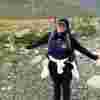In early 2024, Olivia Richardson, a 24 year old administrator from Loughton in Essex, was diagnosed with Uveitis, a rare condition that causes inflammation inside part of the eye.
Just six months later, determined to regain some control in her life, Olivia set herself the ambitious goal of climbing Mount Snowdon to raise funds for eye research and increase awareness of the condition. Olivia explains:

“I was on a walk with my friend, and I thought; ‘something just feels off, something just isn’t right, maybe I’m getting a migraine or something because my vision just doesn’t seem normal.’
I’d had migraines before, so I was used to my vision going a bit weird because of that and things looking like broken glass. So, I thought ‘I’ll sleep it off’ as that’s what normally happens with my migraines. But I woke up the next day and it was still the same.
When I tried to explain to people how my vision was, I said ‘it feels like someone has put cling film over my eye, I feel like I need to take my eye out and wash it’. That’s how it felt!
I spoke to a GP, and they agreed that what I was experiencing was far from normal and so I went to the opticians. They didn’t know what was going on at that point, my left eye was so inflamed. They sent me straight to A&E as they could tell that something wasn’t right, and so I went to my closest eye clinic.
From there I was diagnosed with Intermediate Uveitis which originally, they thought was just in my left eye, but then it was confirmed I had it in my right eye too, but I had no symptoms in my right eye, and I still don’t.
At that point the vision in my left eye was really blurred and I had literally hundreds and hundreds of floaters, but nothing in my right eye, no symptoms at all but they could see the inflammation. I can’t quite get my head round that!
I’ve been in a constant flare since being diagnosed and I’ve been on lots of different medications and drops. I’m on immunosuppressants and oral steroids at the moment, but they’re not working 100% so I’m going to move to try a new type of medication. But I still get very much quieter, but active Uveitis that they just can’t quite get a grip on.
I’ve been tested for all kind of things, but they don’t know what has caused it, so there’s been a lot of trying different things. So, it’s still case of trying to find a treatment that works completely for me.”
How my vision is affected
“My vision fluctuates massively from day to day, when there is a bad flare up, I can only read about two or three lines down the chart, but back in October, as a result of my Uveitis, I developed an epiretinal membrane as well, so now in my left eye, I also have constant distortion and even more blurry vision. I did have surgery on that in February, but I still have distortion and very blurred vision, but it is not quite as bad as it was.
It’s hard to describe to people, but straight lines and objects for example, they look curved, like looking in a funhouse mirror. People’s faces are distorted. Things look not how they are but trying to explain that to people can be really difficult.
The impact of Uveitis on my life
“When it all happened, I was working, I’m a personal assistant. My life is basically staring at screens and looking a detailed information, so my sight is very, very needed, as it is for everything, don’t get me wrong, but it’s not like a manual job with my hands, it is purely looking at stuff.
I’m very lucky, I work for the Bank of England, and they’ve been really supportive, and they are very understanding. But it definitely had an impact on my day to day work, as I was having to go to a lot of appointments and everything has changed. I had to go to a lot of urgent appointments where my ophthalmologist told me if the slightest thing changes, ‘come back straight away’, so it definitely had a big impact that way.”
A-Z of eye conditions
Learn about the symptoms, causes and treatments for over 50 eye conditions, and how the research we fund is making a difference.

Deciding to climb Snowdon for Fight for Sight
“I think because no cause for my uveitis has been found, so I’ve not been diagnosed, for example with an autoimmune disease, the whole time I’ve just felt massively out of control with the situation. And I’m a control freak, so I like to have a handle on everything!
And I’ve felt like I couldn’t do anything or get a handle on any of this. I would try to have more relaxation and try to be less stressed and slow everything down, but nothing was helping, it was just getting worse. So, I thought what can I do to feel like I’m giving back at bit, giving a bit of hope for my future. How could I feel like I was doing something for myself and for everybody else in this situation. So, I thought, yep, I’ll do some fundraising because that will tick all the boxes of what I need and also what everybody else needs for the future.
So, me and my partner Reece decided to climb Snowdon and fundraise for Fight for Sight. I liked Fight for Sight because I really liked their website, I know it sounds really silly, but I remember think that it was really easy to navigate, its really easy to understand. It has a lot of information on Uveitis and its not one of the most common eye conditions and it really broke it down for me and helped me understand it. I thought yeah, that’s it, I’m going to fundraise for them.

"I liked Fight for Sight because I really liked their website. It has a lot of information on Uveitis and its not one of the most common eye conditions and it really broke it down for me and helped me understand it. I thought yeah, that’s it, I’m going to fundraise for them."
Completing the toughest challenge!
So, in September, Reece and I climbed Snowdon, and it was challenging, but it was so good, and I felt a big sense of achievement by the end, knowing that I’d done it.
My depth perception is affected, but strangely I’ve adapted to it really quickly. There was a white out at the top as well so no one could see hardly anything. I wasn’t really stressed about it; my coping mechanism is to try not to think about it and just go with it!
I was also on new medication at that time. I’d recently started immunosuppressants and a high dose of steroids and was really feeling the effects of the steroids. My fatigue was kicking in a lot more and I wasn’t 100% myself. We’d only been walking an hour or so and I can remember saying to Reece ‘I can’t do this, I’m literally exhausted!’
But he was brilliant and said ‘won’t you be gutted if you don’t do this for yourself? People know you can do it, and you’re trying to do it to raise more awareness and educate people about uveitis. You need to do it, and you will do it!’ And of course, I did do it, and I did really enjoy it, and I would do it again, a hundred percent! We raised just over £2,000 and were very happy with that!
Knowing that I’ve made a difference gives me a sense of pride
Reece and I have signed up to do Moorfields’ Eye to Eye Walk this year because I had my eye surgery at Moorfields Eye Hospital. And again, it’s that feeling of I can’t do anything, I want to give back, and their staff and care was unbelievable, so I thought why not?
I was so worried that if I didn’t have stuff to do then I would worry more about my condition, so fundraising is a definitely a distraction and a coping mechanism for me. No one knows what’s causing my uveitis or why it’s so aggressive. They didn’t know if the surgery would make any improvement, so there is a lot of uncertainty with it.

But knowing that I’m raising funds to go towards research, that I’m helping to increase awareness, and that I’m giving back to everyone that’s given to me. It definitely gives me a sense of pride and it gives me a big hope for the future that I’m making a difference. I’m doing what I can to try and help people that are in a similar situation to me.
And I’m making people more aware of uveitis because I’d never heard of it before and none of my friends or family had. Now all of my friends and family know about it and when they talk to people who have vision problems, they will be able to relate more and understand more because they know more about it through me.


